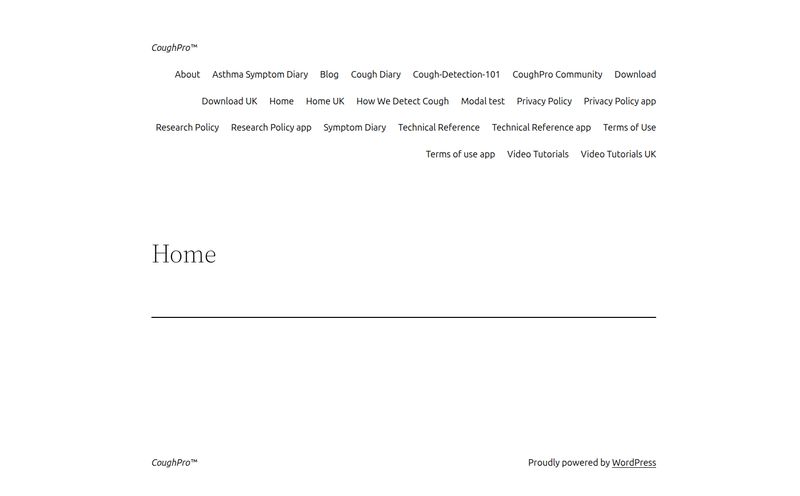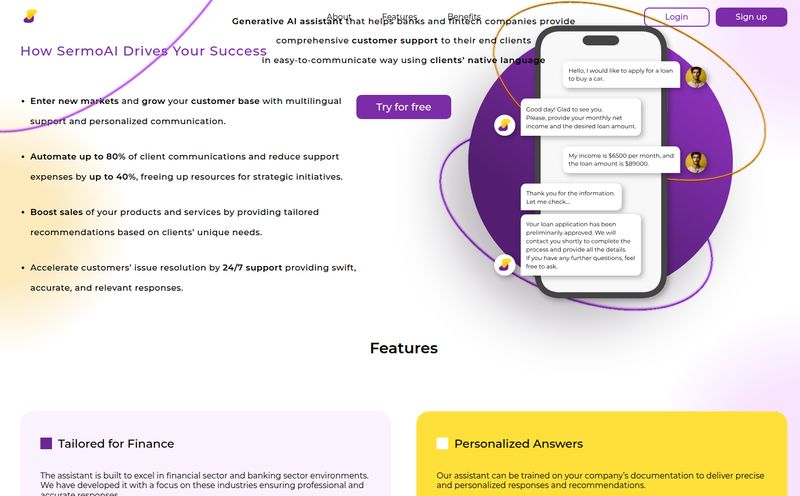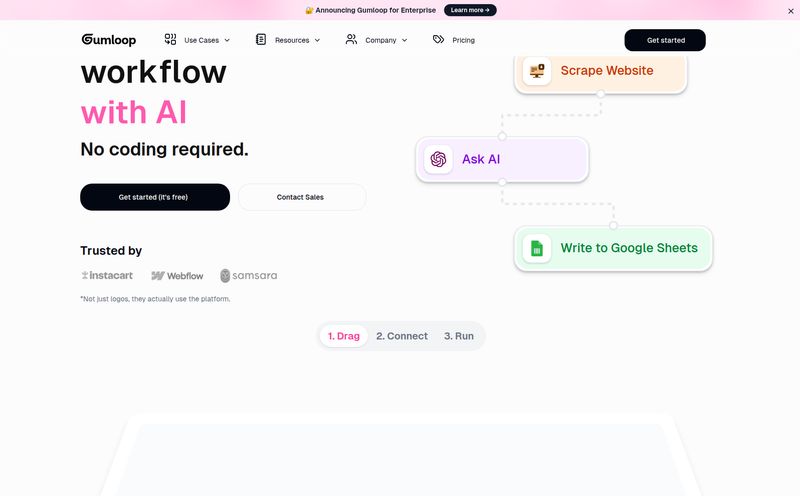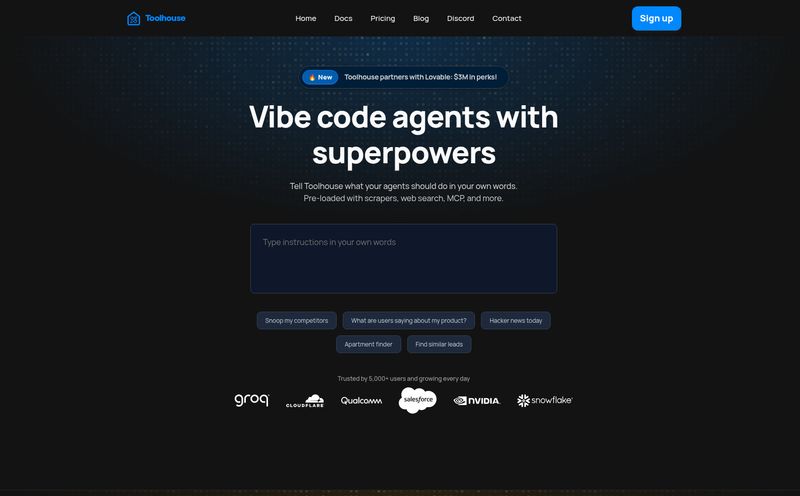We’re all drowning in a sea of digital busywork. Between juggling spreadsheets, scraping websites for competitor data, and trying to stay on top of a million different trends, who has the time to do the actual work? I’ve spent years in the SEO and traffic generation trenches, and if there's one thing I've learned, it's that my most valuable resource isn't a keyword tool or a fat CPC budget. It's time.
So, when I hear about a new tool that promises to be an “AI employee,” my ears perk up. But let’s face it, we’re in the middle of an AI gold rush. A new “game-changing” platform drops every other Tuesday. Most are just thin wrappers around the same core tech. But Suna, by a company called Kortix AI, felt… different. Their big hook? It's 100% open source. That got my attention.
So What Exactly is Suna AI? (And Why Should You Care?)
Think of Suna not as another chatbot that writes poetry, but as a generalist AI agent. It's designed to be a digital companion that actually does things for you. You talk to it in plain English, and it goes off and performs real-world tasks. It's less of a conversational partner and more of a tireless intern who runs on code instead of stale coffee.
The magic here is in the term “agent.” Suna can take a complex request, break it down into steps, and then go execute those steps. This means it can browse websites, manage files, scrape data, and even work with spreadsheets on your behalf. It’s the difference between asking an assistant to tell you how to do something and just asking them to do it.
But the part that really resonates with me, as a long-time tech user, is the open-source philosophy. In an industry increasingly dominated by closed, proprietary “black box” models, Kortix has put Suna’s code right out there on GitHub for anyone to see. This isn't just a gimmick; it’s a statement. It means transparency. It means the community can contribute, audit the code for security, and see exactly what’s going on under the hood. For me, that builds a level of trust that you just can't get with a closed system.
Putting Suna to the Test: Real-World Use Cases
Okay, philosophy is great, but does it actually work? The homepage shows a bunch of intriguing examples that go way beyond simple content generation. We’re talking about some serious time-savers here.
Imagine this: you need a full competitor analysis for a new client in the UK healthcare market. Instead of spending hours manually Googling, you could just ask Suna: “Analyze the market for my next company in the healthcare industry, located in the UK.” Or, as an SEO, the idea of just telling it, “Based on my website suna.so, generate an SEO report analysis,” is pretty tantalizing. It claims to be able to do things like:
- Scrape Forums & Websites: Need to find the top-ranking beauty centers in Rome? Suna can go look.
- Data & File Management: It can work with Excel, pulling information and setting up spreadsheets.
- Complex Research: You can ask it to find and summarize scientific papers or find a list of the most important VC funds in the United States.
- Recruitment & Lead Gen: A prompt like “Go on LinkedIn, and find 10 profiles available - they are not working right now - for a junior software…” could change how small teams source talent.
This is where the agent concept really clicks. It's not just retrieving information; it's interacting, analyzing, and synthesizing across different platforms. It's a genuine workflow automation tool.
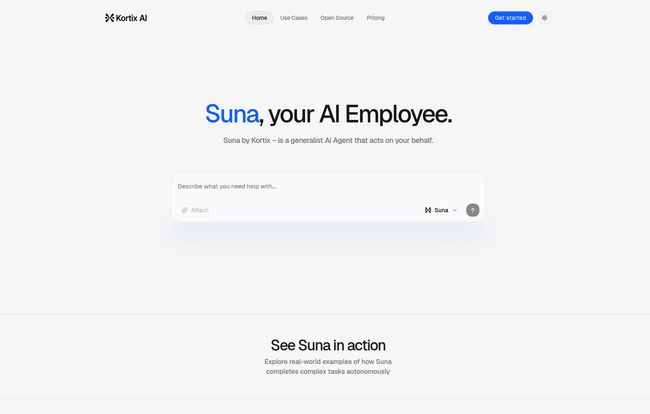
Visit Kortix Suna
Let's Talk Money: Breaking Down Suna's Pricing
Alright, the inevitable question: what's this going to cost me? The pricing page is pretty straightforward, and honestly, surprisingly accessible. They offer a few different tiers, which I appreciate. Not everyone needs an enterprise-level plan.
They also have two main ways of using the service: a cloud version (easy, no setup) and a self-hosted option for the more technically inclined who want total control. I’ll focus on the cloud pricing here as it's what most people will start with. The pricing seems to be based on “AI Tokens,” which is a pretty standard way of measuring usage in the AI world. Think of them like credits. A simple task uses fewer tokens; a complex, multi-step research project uses more.
| Plan | Price (Billed Yearly) | Key Features |
|---|---|---|
| Free | $0 | $5 free AI tokens included, Public projects, Basic Models, Community support. |
| Plus | $17 / month | $20 AI token credits/month, Private projects, Premium AI Models, Community support. |
| Pro | $43 / month | $50 AI token credits/month, Private projects, Premium AI Models, Community support. |
| Ultra | $170 / month | $200 AI token credits/month, Private projects, Premium AI Models, Priority support. |
Note: These prices reflect the yearly discount. Monthly options are also available.
Having a free plan is a huge win. It lets you kick the tires without pulling out your credit card. The jump to the Plus plan at $17/mo (billed yearly) seems very reasonable for unlocking private projects and the more powerful models. That’s probably the sweet spot for most freelancers and small businesses.
My Honest Take: The Good and The Not-So-Good
No tool is perfect, right? After digging in, here's my unfiltered take.
The Good Stuff
For my money, the best part is the versatility combined with its open-source core. It's a powerful combination. You get a tool that can tackle a wide array of tasks, from SEO analysis to lead generation, and you get the peace of mind that comes with a transparent, community-vetted codebase. The fact that you can see the code, fork it, and even contribute is a massive plus for anyone who values control and transparency.
Potential Bumps in the Road
On the flip side, the usage limits on the lower-tier plans are something to be aware of. Those AI token credits can get used up quickly if you’re running complex, multi-hour tasks. It’s a classic freemium model: the free taste is great, but heavy users will need to upgrade. Also, while the cloud version is plug-and-play, the self-hosting option will require some technical know-how. That’s not really a con, just a reality. You can't expect to host your own AI agent without getting your hands a little dirty in the command line. So if you're not a developer, stick to the cloud plans.
Who Is Suna AI Really For?
So who should be sprinting to sign up? I see a few key groups.
First, SEOs, marketers, and researchers. The ability to automate competitor research, data scraping, and reporting is a game-changer. This could free up dozens of hours a month.
Second, entrepreneurs and small business owners. When you’re wearing a dozen hats, a tool that can act as a part-time researcher, data analyst, and admin assistant is incredibly powerful.
And finally, developers and the tech-curious. The open-source nature makes Suna a fantastic sandbox. You can learn from it, build on it, and integrate it into your own custom workflows. It’s a tool that grows with your skills.
Final Thoughts on My New AI Employee
I’m genuinely excited about Suna AI. It feels like a step in the right direction for artificial intelligence—away from closed-off, mysterious systems and towards open, collaborative tools that empower users. It's not just a product; it’s a project. One that invites you to participate.
Is it going to replace your entire team tomorrow? No. But could it become your most productive “employee,” handling the tedious tasks that drain your energy and creativity? Absolutely. It’s a powerful new player in the automation space, and with its commitment to transparency, I think it’s one that’s built to last.
Frequently Asked Questions about Suna AI
- Is Suna AI free to use?
- Yes, Suna offers a free plan that includes a set amount of free AI tokens each month. It’s a great way to try out the platform’s basic capabilities on public projects before committing to a paid plan.
- What exactly are AI tokens?
- AI tokens are the units of measurement for the work Suna does. Think of them as credits. Simple, short tasks use a small number of tokens, while more complex and lengthy tasks, like in-depth research or data analysis, will consume more tokens.
- Do I need to be a developer to use Suna?
- Not at all! The cloud version of Suna is designed to be user-friendly. You just type your request in natural language. You only need developer skills if you want to take on the challenge of self-hosting the agent on your own server.
- What makes Suna different from other AI tools?
- The two main differentiators are its function as an “AI agent” and its open-source nature. It’s built to do tasks, not just talk about them. The open-source codebase means its transparent, auditable, and community-driven, which is a major trust factor compared to many proprietary AI systems.
- Can Suna work with files like Excel or PDFs?
- Based on its capabilities for data analysis and file management, Suna is designed to interact with various file types, including spreadsheets like Excel. You can upload files and ask Suna to analyze or extract information from them.
- What is the Apache 2.0 License?
- The Apache 2.0 License is a permissive free software license. It allows users to use the software for any purpose, to distribute it, to modify it, and to distribute modified versions of the software under the terms of the license, without worrying about royalties. It's a very popular choice for open-source projects.
